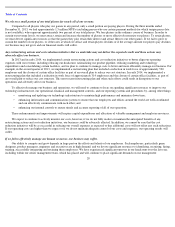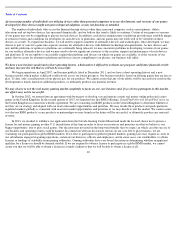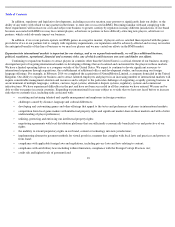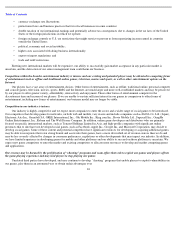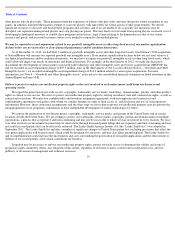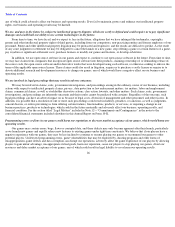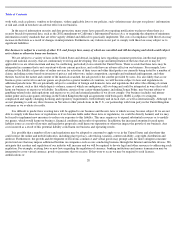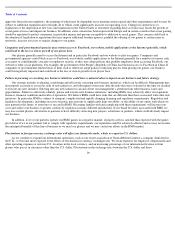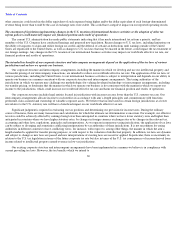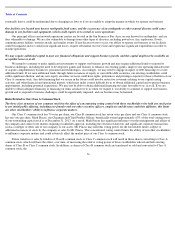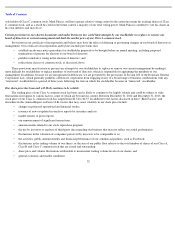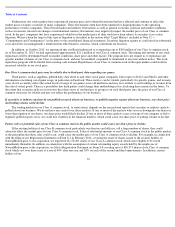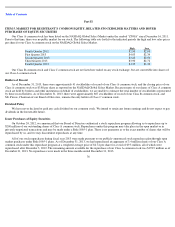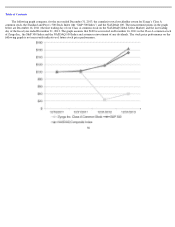Zynga 2013 Annual Report Download - page 34
Download and view the complete annual report
Please find page 34 of the 2013 Zynga annual report below. You can navigate through the pages in the report by either clicking on the pages listed below, or by using the keyword search tool below to find specific information within the annual report.
Table of Contents
other currencies could result in the dollar equivalent of such expenses being higher and/or the dollar equivalent of such foreign-denominated
revenue being lower than would be the case if exchange rates were stable. This could have a negative impact on our reported operating results.
The enactment of legislation implementing changes in the U.S. taxation of international business activities or the adoption of other tax
reform policies could materially impact our financial position and results of operations.
The current U.S. administration has made public statements indicating that it has made international tax reform a priority, and key
members of the U.S. Congress have conducted hearings and proposed new legislation. Recent changes to U.S. tax laws, including limitations on
the ability of taxpayers to claim and utilize foreign tax credits and the deferral of certain tax deductions until earnings outside of the United
States are repatriated to the United States, as well as changes to U.S. tax laws that may be enacted in the future, could impact the tax treatment of
our foreign earnings. Any changes in the U.S. taxation of our international business activities may impact our worldwide effective tax rate, our
financial position and results of operations.
The intended tax benefits of our corporate structure and intercompany arrangements depend on the application of the tax laws of various
jurisdictions and on how we operate our business.
Our corporate structure and intercompany arrangements, including the manner in which we develop and use our intellectual property and
the transfer pricing of our intercompany transactions, are intended to reduce our worldwide effective tax rate. The application of the tax laws of
various jurisdictions, including the United States, to our international business activities is subject to interpretation and depends on our ability to
operate our business in a manner consistent with our corporate structure and intercompany arrangements. The taxing authorities of the
jurisdictions in which we operate may challenge our methodologies for valuing developed technology or intercompany arrangements, including
our transfer pricing, or determine that the manner in which we operate our business is not consistent with the manner in which we report our
income to the jurisdictions, which could increase our worldwide effective tax rate and harm our financial position and results of operations.
Our corporate structure includes legal entities located in jurisdictions with income tax rates lower than the U.S. statutory tax rate. Our
intercompany arrangements allocate income to such entities in accordance with arm’s-length principles and commensurate with functions
performed, risks assumed and ownership of valuable corporate assets. We believe that income taxed in certain foreign jurisdictions at a lower
rate relative to the U.S. statutory rate will have a beneficial impact on our worldwide effective tax rate.
Significant judgment is required in evaluating our tax positions and determining our provision for income taxes. During the ordinary
course of business, there are many transactions and calculations for which the ultimate tax determination is uncertain. For example, our effective
tax rates could be adversely affected by earnings being lower than anticipated in countries where we have lower statutory rates and higher than
anticipated in countries where we have higher statutory rates, by changes in foreign currency exchange rates or by changes in the relevant tax,
accounting and other laws, regulations, principles and interpretations. As we operate in numerous taxing jurisdictions, the application of tax laws
can be subject to diverging and sometimes conflicting interpretations by tax authorities of these jurisdictions. It is not uncommon for taxing
authorities in different countries to have conflicting views, for instance, with respect to, among other things, the manner in which the arm’s
length standard is applied for transfer pricing purposes, or with respect to the valuation of intellectual property. In addition, tax laws are dynamic
and subject to change as new laws are passed and new interpretations of existing laws are issued or applied. In particular, there is uncertainty in
relation to the U.S. tax legislation in terms of the future corporate tax rate but also in terms of the U.S. tax consequences of income derived from
income related to intellectual property earned overseas in low tax jurisdictions.
Our existing corporate structure and intercompany arrangements have been implemented in a manner we believe is in compliance with
current prevailing tax laws. However, the tax benefits which we intend to
30


